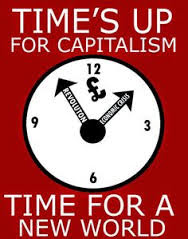Just because Socialist Party holds a different view from many eco-activists it does not mean that we question the seriousness of the present ecological crisis nor that we think we are living in the best of all possible industrialised worlds. Far from it. There is an ecological crisis and it is serious, but its cause is not the pressure of population or industrialisation. The cause of the climate crisis is the capitalist system where firms compete for profits and where the resulting competitive pressures impose the accumulation of more and more capital out of profits as the over-riding economic goal (what some call “blind economic growth"). This being so, the solution lies neither in depopulation nor in deindustrialisation but in getting rid of the profit system that is capitalism and replacing it with socialism and production for need.
We live in a world based on commodity production with the aim of obtaining a profit. In competing with other capitalists, both nationally and globally, it is necessary to drive down costs in order to grab a bigger share of the market. In such a cut-throat society environmental considerations count for little, except perhaps a little electioneering rhetoric. If we are serious about surviving and leaving our planet to our descendants in a liveable state, without a huge environmental debt impossible to settle, what we really need is to urgently abandon altogether the monetary, for-profit economy itself and to embrace the socialist system of resource administration as the truly humane, sustainable and fair system of social and economic organisation that respects nature and the scientific principles of its management. There is, quite simply, no solution to the problem of global warming within capitalism. And the simple truth is that we place our trust in governments to solve environmental problems within the context of capitalism at our peril. They serve to administer the present system on behalf of a minority for whom environmental protection is an obstacle to profit, to whom any means is legitimate in the pursuit of that profit.
When you consider the future of the planet you are faced with two choices. You can continue to support the defenders of capitalism – they come in many disguises – and acquiesce in the destruction of the natural global environment or stand in their way by joining the struggle for socialism and the destruction of a system that will nonchalantly prioritise profit over not only human well-being but the world we live in. But, hey, don’t wait until your living room is a foot deep in water to make up your mind. Think hard and now. Capitalism, and with it the worsening of every environmental problem we cite, or socialism, a world social system that places control of the Earth in the hands of a global majority who will tend to it with respect and without the barriers profit places in the path of production?
Despite the overwhelming evidence for mankind’s ability to produce an abundance of the means of life, including food, there is growing evidence that if humanity continues to ruthlessly plunder his environment in the way it has done over the last hundred years or so then the gloomy predictions of the ‘miserable parson’ Malthus may become true. Rivers, oceans, the atmosphere and the land may steadily become less productive as the result of the irrational drive to accumulate wealth on the part of a minority.
The workers of the world do all the producing and wealth creation, yet we are the last to realise the benefits when profits are growing. And the first to experience the hardships of downturns, recession and austerity. The World Socialist Movement, is like no other organisation, insofar as we are the only group calling for an end to capitalism, and for it to be replaced by global socialism. This would be a world based on a revolutionary change in the means of production, from being owned by a tiny minority to being held in common ownership with free access to goods and services according to individual and self-defined needs. It is a great pity that people do not realise that before the environment can become clean and decent a tremendous transformation in human organisations and institutions is necessary and that the main arguments he puts forward are holding up this transformation by offering false solutions to the wrong problems.
If production was geared to meeting needs, on the basis of the common ownership and democratic control of productive resources, then not only could modern technology and industrial resources be used in a non-polluting way (productive units would no longer be under competitive pressures to minimise costs at the expense of social and ecological considerations) but the whole of the world's present population could be adequately fed and housed.






